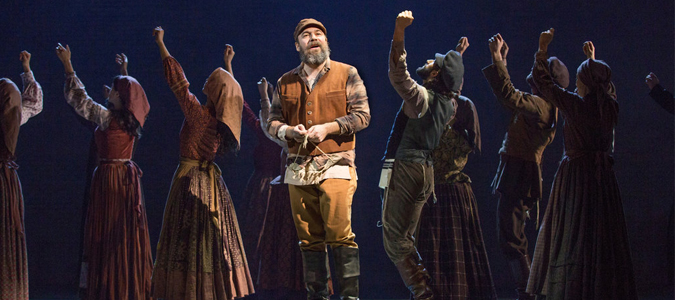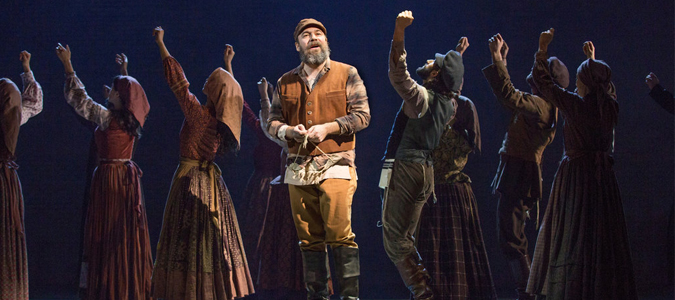

Fiddler on the Roof
Opening Night: December 20, 2015
Closing: December 31, 2016
Theater: Broadway Theatre
Based on the stories of Sholom Aleichem, “Fiddler on the Roof” takes place in Anatevka, a village in Tsarist Russia during the eve of the revolution. Tevye is a poor milkman who cares for his five daughters. While he and the rest of the elders in the village are deeply routed in tradition, his daughters’ forward thinking clashes with Tevye’s principles and causes a rift in the family.
BUY TICKETSREAD THE REVIEWS:
December 20, 2015
A framing device in the “Fiddler on the Roof” revival just opened at the Broadway Theatre has Tevye make his entrance clad in a solid red parka—a jacket any 21st-century New Yorker might keep on hand for winter. We sharpen our gaze and squint: Yes, that’s leading man Danny Burstein, beloved star of “Cabaret” and “Follies,” on a barren stage, beneath a sign in Cyrillic: “Anatevka.” But what’s this? No yarmulke? None of the sartorial trappings of Imperial Russia-era Judaism? This is Tevye? Turns out, it’s not Tevye. This “Fiddler,” helmed by the protective Bartlett Sher (“The King and I”), is bookended by scenes featuring a man we can interpret to be a present-day descendant of the tradition-cherishing milkman, famously “blessed” with five daughters.
READ THE REVIEWDecember 20, 2015
Although the titans Zero Mostel, Jerome Robbins and Harold Prince are reflexively linked to this 1964 classic, there’s another, uncredited, father of “Fiddler on the Roof.” It’s Marc Chagall, the painter whose flying violinists inspired the title. During the development of “Fiddler “(when it was still called “Tevye”), director-choreographer Robbins approached Chagall to do the set and costumes. The artist couldn’t commit, but his spirit lingered. Now, in Bartlett Sher’s magnificent, life-affirming revival, the Chagallian gift of levitation extends not just to an airborne fiddler (in a purple coat straight out of “Green Violinist”) but also to the very buildings of Anatevka, which designer Michael Yeargan suspends in midair. The image is dreamy yet cautionary, evoking a feeling of carefree weightlessness but also serving as a reminder that our little lives can be uprooted and blown to the wind at any moment.
READ THE REVIEWDecember 20, 2015
It’s a sad reality that at virtually any point in history, somewhere on the planet, persecuted peoples are being driven from their homelands as they seek fundamental dignity for themselves and better lives for their children. That eternal theme of forced emigration acquires powerful cumulative pathos in Bartlett Sher’s beautiful revival of Fiddler on the Roof, led by a performance of aching humanity from Danny Burstein as the dairyman Tevye. The 1964 musical’s rousing prologue stresses the value of “Tradition,” and this staging honors that imperative while at the same time providing a robust connective thread between the story and our world a century later. No less than, say, A Chorus Line, any production of Fiddler has to contend with the long shadow of the indelible original, which ran almost eight years, directed and choreographed by Jerome Robbins and produced by Harold Prince. A facsimile of that staging returned three times to Broadway over the next decades, and only director David Leveaux’s 2004 revival with Alfred Molina has attempted to put a new stamp on the show, albeit while retaining Robbins’ iconic choreography.
READ THE REVIEWDecember 20, 2015
Bartlett Sher’s shows tend to announce themselves with a visual bang, an effect that delights the eye and lassoes us into the story: The levitating orchestra floating away to reveal the sun-splashed setting of South Pacific; the ship that all but docks in our laps at the beginning of The King And I. For Fiddler On The Roof, which opened tonight at the Broadway Theatre, Sher has something quieter, if no less dramatic, in mind. Instead of Tevye welcoming us to the tiny little town of Anatevka, where life without tradition would be as shaky as a you-know-who, we have a bearded, capless man in a bright red parka, reading from a book the opening words from the stories of Sholom Aleichem, Tevye’s creator, to the wandering Fiddler standing down stage right. This is the place, these are the people.
READ THE REVIEWDecember 20, 2015
The sorry state of the world gives us new reason to appreciate the depth of feeling so powerfully, so ingeniously embedded in “Fiddler on the Roof,” the much-loved and much-revived 1964 musical comedy that has returned to Broadway at a time when its story of the gradual disintegration of a family, and a community, strikes home with unusual force. The superb new production, which opened on Sunday at the Broadway Theater, certainly honors the show’s ebullience of spirit, as embodied in the central character of the Jewish milkman Tevye, living in a Russian shtetl in the early 20th century, eternally wagging his tongue, shaking his fist and cracking wise at an indifferent God. But as directed by Bartlett Sher with his customary sensitivity (“The King and I,” “South Pacific”), this multihued staging moves to a heart-stopping conclusion. It’s impossible to watch the people of Tevye’s town, Anatevka, marching toward their unknown destinies in the shadow of a threatened pogrom without thinking of the thousands of families fleeing violence in the Middle East and elsewhere today.
READ THE REVIEW






















